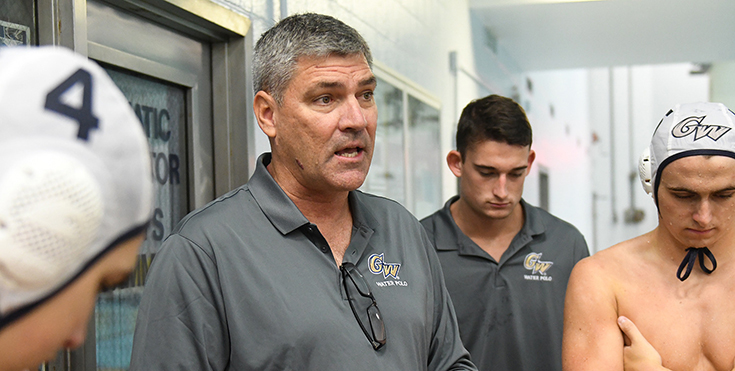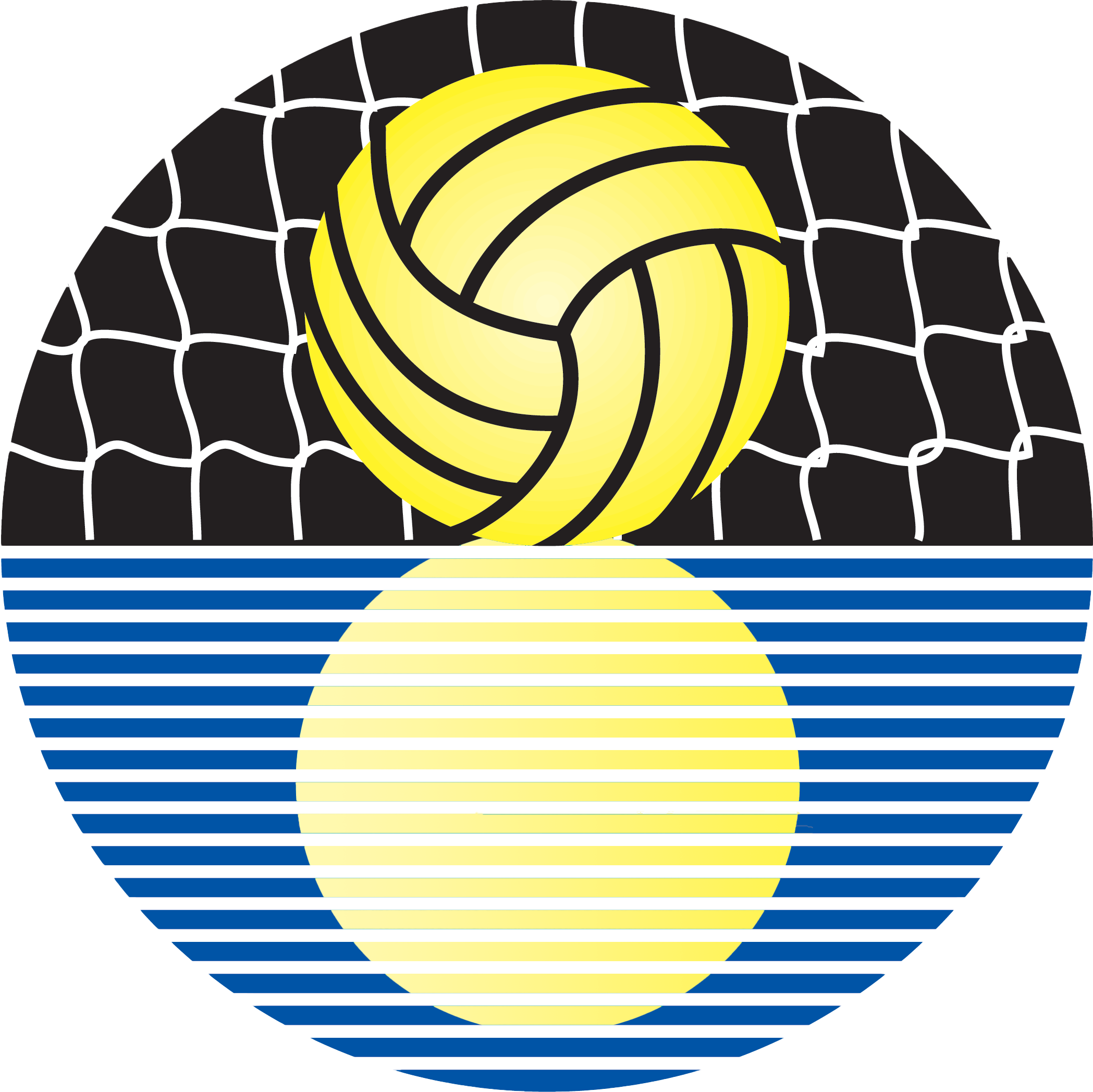BROOKLYN, N.Y. — Following 19 years leading the program that he founded, Barry King stepped down as head coach of the Indiana University women’s water polo program in May of last year. Becoming a full-time dad for sons Creighton (17) and Aiden (14), King stayed on the sidelines for a full year—until Adam Foley unexpectedly resigned as the head coach for the George Washington University men’s and women’s teams. In a move with many benefits, King and his family—including wife Mindy—made the trek from Bloomington to our nation’s capital to settle in with Colonials’ polo.
“It was more of looking for new challenges,” said King recently at the Princeton University Invitational, “I thought that I had done some good things at Indiana but that my efficacy there had run its course. It was time for some other influences for that program.”
Born in Madera, Calif., King graduated from Fresno State University then worked his way up the coaching ranks of Southern California swimming and water polo clubs. A fortuitous move to Bloomington to pursue a doctorate in exercise physiology led to a proposal to launch a women’s water polo team at one of the nation’s leading public universities.
With a record of 426-225-2 (.654) and six appearances in the National Collegiate Athletic Association (NCAA) Women’s Water Polo Tournament, including a Final Four appearance in 2003, King built the Hoosiers into a powerhouse program competing in the Collegiate Water Polo Association (CWPA).
In an interview with Michael Randazzo, a New York-based water polo journalist, King spoke about moving his family to the nation’s capital, the challenges he assumes at George Washington, and taking on the added responsibility of a men’s team that last season greatly exceeded expectations.
After leaving the sport for a year, you decided to come back—and move your family 1,000 miles East.
Through the year off I just had a blast being my kids’ father. I was looking for the things that were going to be the next chapter and essentially at the same time my older son, who was a junior in high school, said that he wanted to study political science in Washington D.C.—and [then] the George Washington job opened up.
It’s not necessarily the chicken or the egg question, but the egg hatched pretty much at the same time.
GW has always intrigued me because of what I think it should be able to do and what it had done. As we got further into [discussions] I realized I could help them be better.
You’re a Californian by birth and have spent time all over the country. How is it to now be on the East Coast?
I was a well-traveled kid—my father made sure of that. People have asked me what the difference is and I said: “I don’t even look for differences.” 24 years in Bloomington and then moving to D.C.—there’s no comparison, and there’s no reason to. Both are fantastic places to live in their own rights, so I’m just taking in what D.C. has to offer.
First off, every day I’m there I walk around wishing I had gone to school in D.C. The environment is alive and I can’t imagine a better situation today for a college student.
As a coach, it’s a challenge to get kids to focus because they have a lot of options. But it takes a certain kind of kid to get into GW and be successful—and that kid is the kind of athlete who’s going to be able to put their life in columns and be in the right place at the appropriate time.
I knew the facility challenges and resources coming in, but part of my job is to help make and sustain the program’s relevance so that we can ask for more support. The program is surrounded by terrific people who maximize everything we have in terms of our facilities. It’s just a matter of doing the most with what you have until someone wants to give you more.
Ted Minnis (Harvard men’s and women’s water polo coach) called you “The King.” Clearly you are respected by your fellow East Coast coaches!
I am Barry King, not “The King” [laughs]. It’s fortunate to move in on the men’s side and I’ve had relationships with many of the coaches previously through coaching on the women’s side. Ted and I have been friends for a long time, as have Luis [Nicolao, Princeton men’s and women’s coach]. It’s fun to get to double up the time we get to spend together.
A parent of one of your players referred to you as an “old school coach.”
I think I’d mostly agree with that. Probably what they’re reacting to is [that] I believe in taking responsibility, I believe in making your teammates better. I would accept the old-school label because for me the player coach label connotes a certain amount of lack of responsibility.
If that we’re they’re reacting to then yes; noted and accepted.
You go from coaching women in Indiana to leading both the men’s and women’s programs at George Washington.
There aren’t many differences in terms of what the goal is and the people that you’re working with. There are some differences in certain resources available but at the end of the day we are pursuing a chance to play in the [Mid-Atlantic Water Polo Conference] championship game.
I have a bit more of a learning curve on the guys’ side because of previous relationships and having coached against these guys on the women’s side. They don’t do much differently in terms of their structures—I feel like I’ve seen a lot of this before.
Do you find there are distinct differences between the men’s and women’s games?
In regards to what happens in the water, absolutely. Just the suit factor alone is a gigantic difference in the way you play defense between the men and the women. The men move a bit more because they can—and there isn’t somebody hanging on to your suit the entire game.
In terms of the structure and the way that goals are built, I’m asking my guys to do the same things with the same kind of energy, with the same kind of structure that I’ve asked of women for 20 years.
Last year, the Colonials’ men caught the rest of their conference by surprise. When you look at the team that you inherited, what is it that impresses you most?
The strengths are that we’ve got good balance. There’s two freshmen left-handers [Andras Levai and Kerim Sismanoglu] who have contributed a lot to that. Our ability to attack from both sides of the pool helps quite a bit. We’re short-handed—I’d like to see us get some more depth. Even now, when we have a couple of injuries that makes for a long four-day weekend, especially with the kind of quality of opponents that we’re playing [at Princeton].
The biggest challenge is because of their discovered success last year; the challenge is to learn how to accept the responsibility now being the team that people are looking at. It’s easy to sneak up on people when you’re 0-10 and there’s zero expectations on you.
Now teams are prepared. They expect us to be at a certain level and that’s the challenge: to not only be of that level but to be better, and accept that responsibility.
When you look at the competition in your conference, where do you see the Colonials?
That’s a conversation we’ve had as a team in the context of accepting responsibility for being the team… I think Wagner is in the position there this squad was last year, where there are some question marks but you can see them building there. But, everybody’s had success against them in their first year. Now they’re starting to congeal.
I felt a real sense in our first couple of weeks together that the focus was about getting back to that game with Bucknell. And I was trying to tell [my team] that everybody else has gotten better—and Bucknell may not be in that game. So, our focus needs to be that we want to be in that game against whomever makes it, and not be so focused on beating Bucknell.
I think it’s gonna be a blast. I think the conference is going to be a lot of fun. You saw the first conference game of the year [on September 8], Navy vs. Wagner [won 11-10 by Wagner]. You get to see everybody in the division now; I think the conference season is going to be a terrific amount of fun.
As you look to build for the future, what sorts of goals do you have?
We want to be in the conversation, we want to be relevant, and when you’re relevant—to your campus, to your department, to your alumni—the ask is a lot easier, and it makes sense to the people that you’re approaching.
If we can get to and sustain that level where people come and ask me: “What do you need?” instead of me having to reach out and say: “We need this.”




